Redtails Pinktails founder Rob Clarke says competition shutdown requires urgent sit-down
The sudden halt of an Alice Springs community football competition requires urgent negotiation, one of the Red Centre’s leading sporting voices says.
Northern Territory
Don't miss out on the headlines from Northern Territory. Followed categories will be added to My News.
Locking football out of two Alice Springs’ major sporting grounds is a sign of “community failure”, a leading voice in Red Centre sport says.
Alice Springs Town Council on Tuesday voted to block the Central Australian Football League’s 10 community division teams from playing at Traeger Park and Albrecht Oval this season because of anti-social behaviour.
Councillor Michael Liddle said games delivered an extra 1500 people into town every weekend and the town needed “respite”.
However, Redtails Pinktails Right Tracks program founder Rob Clarke said the situation required an urgent sit down between all stakeholders.
Mr Clarke said it would take a holistic approach from all involved – from fans, players, clubs to peak body AFLNT – to improve the situation.
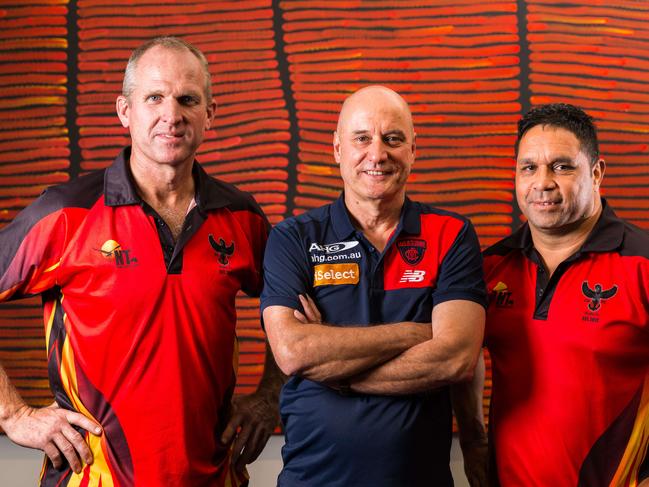
“We’ve failed as a community if that is the outcome, we’ve actually failed,” he said.
“If you’ve got something that inspires young people … it’s a community failure if you don’t use that opportunity.
“We’re missing opportunities to change things (in society).
“Otherwise this is going to be a discussion point for a long period of time.
“We’re basically going nowhere.”
Mr Clarke admitted there was a lack of discipline, structure and adequate penalties for poor behaviour in the competition.
However, he refused to point the finger at any particular organisation or club, but said it would take a renewed, collaborative approach to restore the competition.
Mr Clarke was concerned local football was one of the few things left to teach people healthy habits like discipline and resilience.
“This is the only thing we have left which has discipline in it,” he said.
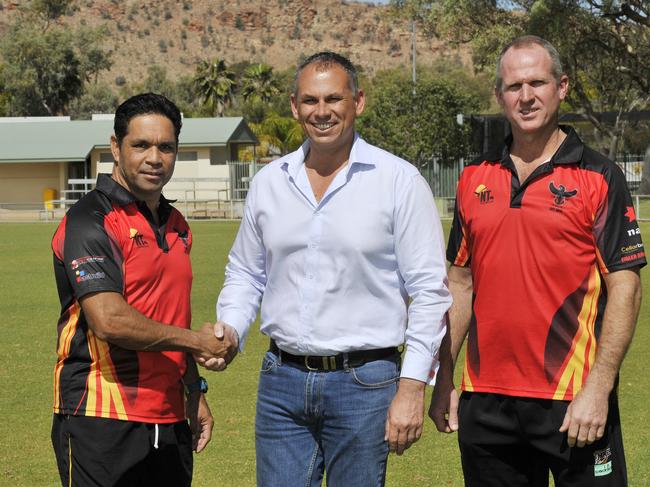
“It’s all we’ve got left, schools are struggling with discipline, we’re going backwards at a fast rate.
“This is one of the few spaces we have left that can heal, that can direct and grow and we’re not using it well.
“We’re missing the bus big time.”
Mr Clarke said he understood the council’s decision but could not accept it as an outcome.
Meanwhile, Central Land Council chief executive Les Turner said he was “deeply disappointed” by the decision to “lock the community competition out of the town’s sporting fields”.
“It is a backward step for the (local) council to ban the teams ... where they have played for many years,” Mr Turner said.
“Footy helps create positive social outcomes and unites our town at a time when we all need to pull together.”
Mr Turner said the Alice Springs council was “understandably concerned” about bad behaviour at games but the decision was “divisive”.
“(It) should work with the AFLNT and governments to improve the infrastructure and facilities in our communities,” he said.
“Football is one of the few joys for our community members. It is a pathway to a healthy life and future opportunities.
“Our kids should not be locked out of Alice Springs.”
The league has been asked by this publication where games could be played if the council-ban remains in place.
Red Centre football competition in doubt
A three-month footy competition that drives hundreds of remote players into Alice Springs every week has been left in doubt.
A long-running debate to push the Central Australian Football League community competition back out to the bush was reignited at an Alice Springs Town Council meeting on Tuesday.
Councillor and Alyawerre man Michael Liddle moved a motion that council pull its support for the 2023 season, due to start in May.
Cr Liddle said players wanted the competition back in their communities while having it in Alice Springs caused anti-social behaviour.
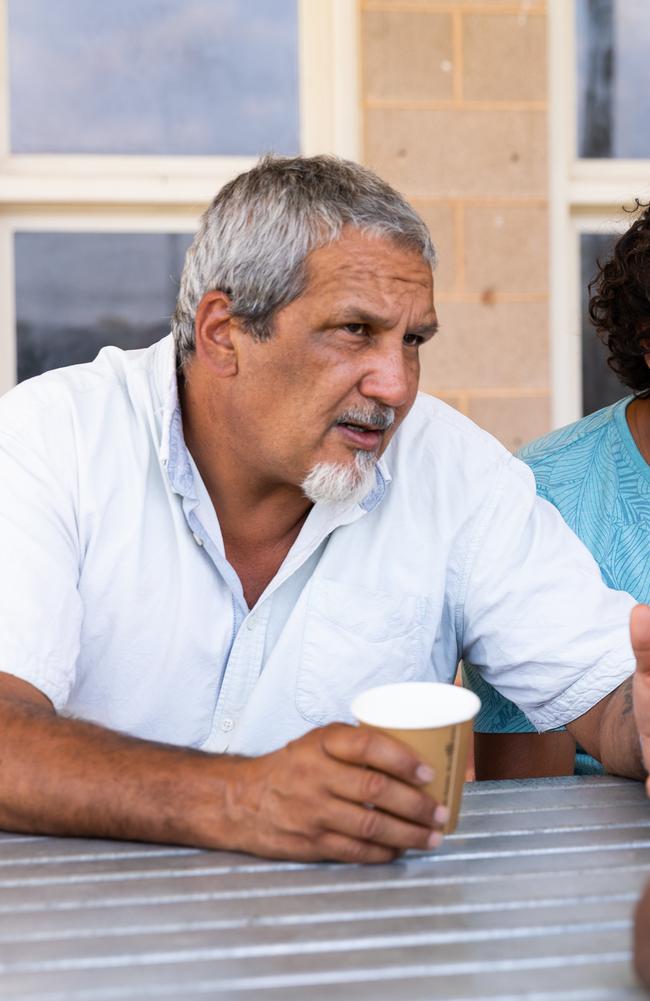
“I think the town of Alice Springs needs to breathe, it needs respite,” Mr Liddle said.
“The continuation of the community football on the Sunday will not bring change to what Alice Springs is currently enduring at the moment.
“The purpose of this is to pause the competition so that everyone can stand back and have a look at just what’s going on inside here – you’ll see a lot of problems.”
Cr Liddle said the competition of eight teams, held at council-owned grounds including Traeger Park and Albrecht Oval, brought an extra 1500 people into the town every weekend.
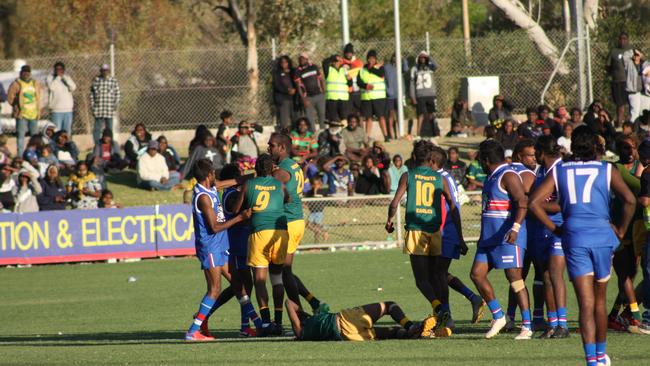
“(About) 300, 400 of those people will stay here from remote communities and there’s already remote community people living in Alice Springs from the previous three seasons,” he said.
“They haven’t gone back home … they’re stranded in town.
“The main key problem is a lack of attendance in school.
“Of the kids coming into town, how many are actually going to school?”
‘Significant deficit’ in bush footy facilities
About a year ago, Cr Liddle called for a pause on the competition because of the “chaos” it created in town.
But in 2021 Central Australian MLAs approached AFLNT chairman Sean Bowden to discuss the return of the competition to remote communities.
After drafting a fixture, competition model and cost analysis, Mr Bowden said a lack of adequate infrastructure in the bush prevented it from being feasible.
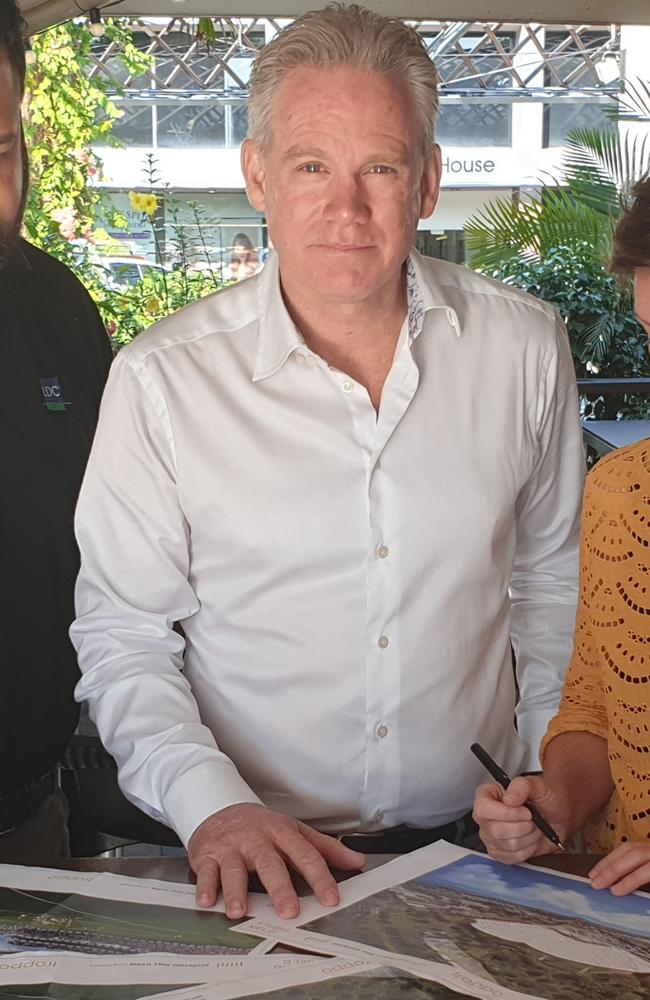
In a letter from Mr Bowden to the council ahead of Tuesday’s council meeting, he said AFLNT’s aim was to one day have the competition back out in the bush but supported the upcoming season being held in Alice Springs.
“There is a significant deficit in remote facilities, we want to support appropriate and targeted investment,” the letter read.
“(This) ranges from unsafe playing surfaces to having no access to drinking water to non-existing changerooms for men, women and umpires, among other things.
“There is significant evidence-based research that demonstrates that football is the pathway to good social outcomes that improves and enhances people’s lives.
“We can’t take football away from young people across Central Australia.”
Mayor describes AFLNT as ‘roadblock to progress’
However, Mayor Matt Paterson along with Cr Liddle said AFLNT and other stakeholders had had plenty of time to move the competition out of Alice Springs.
“This is not about saying ‘if you live in a community, you’re not able to play football’,” Mr Paterson said.
“It’s actually a rocket up AFLNT and the government to start investing in remote communities.
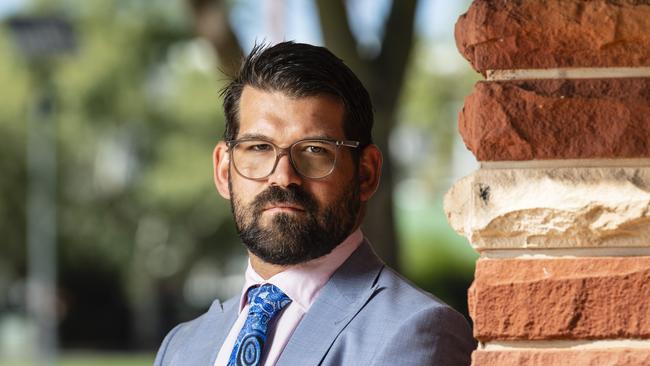
“What we’re seeing is probably a lack of trust from AFLNT to community members that they won’t empower them to be able to run an AFL competition.
“Quite clearly, the infrastructure is good enough because they do have sporting carnivals out bush and they do play AFL and they organise it themselves.
“AFLNT are the roadblock to progress, I think they are being detrimental in remote communities’ economies.”
The mayor along with councillors Eli Melky, Allison Bitar, Steve Brown, Mark Coffey and Cr Liddle voted in favour of cancelling the season.
Councillors Marli Banks and Gavin Morris voted against the motion, saying there was not enough evidence on hand to support it.
Councillor Kim Hopper was not present at the vote but previously spoke in opposition to the motion for the same reason.
Councillors Morris and Banks also raised concerns the move could be racially discriminative.
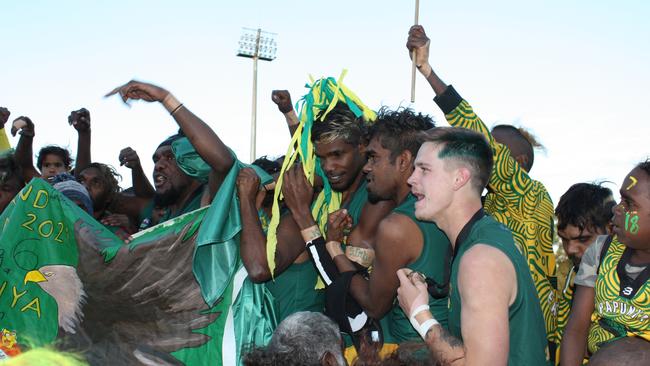
AFLNT, league ‘deeply disappointed’
An AFLNT spokeswoman said in a statement released after the council meeting on Tuesday the decision was “deeply disappointing”.
“To date, no evidence around the supposed negative impact the community competition has on social issues in Alice Springs has been provided,” she said.
“On the contrary, there is significant evidence-based research that demonstrates that football is a pathway to good social outcomes that improves and enhances people’s lives.
“AFLNT also notes that the Community Competition only runs across eleven weeks of the year, from May to August.
The spokeswoman said AFLNT had discussed “a strategy to progress community football” with the federal and Territory governments, Central Land Council and other stakeholders.
“(This) includes the need for major investment into remote infrastructure,” she said.
“AFLNT will consider its position as it relates to the decision.”




